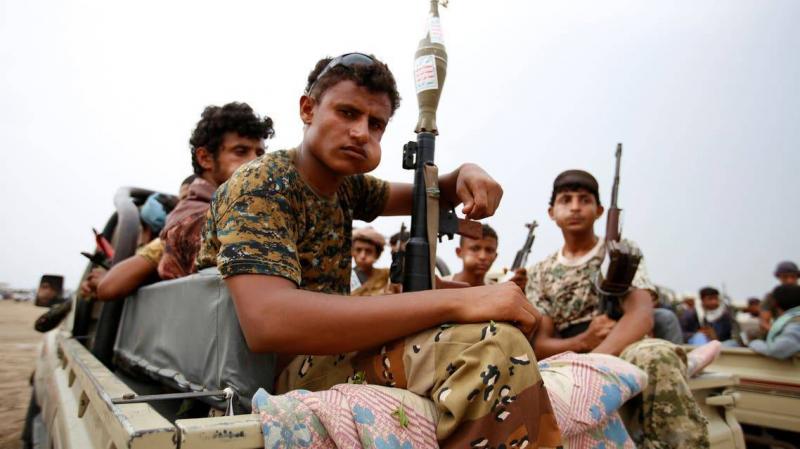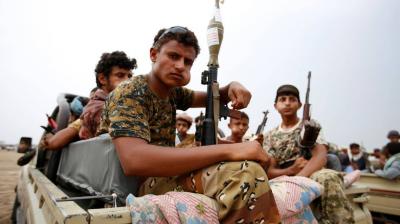Yemen is suffering from three crises since the Russian military operation in Ukraine, exacerbated by the practices of the Houthi militias. The Arab country, with a population of around 30 million, is facing a shortage of wheat supplies, rising food prices, and an increase in fuel prices for the fourth consecutive time. A human rights report revealed that the militias ranked second after ISIS in carrying out terrorist attacks in 2021.
According to international reports about the specter of famine, Yemen imports nearly all of the wheat it needs, with more than a third coming from Russia and Ukraine, and relies heavily on bread. It also imports various staple food items from Ukraine, either through Yemeni commercial institutions or through relief organizations that distribute them to displaced persons and those affected by the Houthi war.
Yemen is the first Arab country threatened by famine due to the ongoing cycle of war for more than seven years, in addition to concerns about worsening hunger, rising food prices, and severe inflation due to the Ukrainian crisis. In its latest report, the World Food Program stated that prices of essential food items in Yemen have risen unprecedentedly due to the repercussions of the war in Ukraine, pushing millions of Yemenis into hunger.
Prior to this, the United Nations warned that millions of Yemenis "do not have enough food during Ramadan" amid one of the worst humanitarian crises in the world, in a country mired in deadly conflict for more than seven years. For months, the UN has complained about a severe funding shortage for humanitarian operations in Yemen, leading to a reduction in assistance for millions of residents.
In a recent report, the International Committee of the Red Cross stated that the conflict in Ukraine "could limit Yemenis' access to their basic needs," noting a massive increase in food prices, making half of the country in need of food assistance. Economic specialist Majid Al-Daari stated that Yemen "relies on wheat and oils from Ukraine, as well as on Russian wheat accounting for up to 25 percent." He explained to "Sky News Arabia" that "sanctions on Russia and the isolation of Russian banks from the global financial system have contributed to halting food imports of wheat, barley, oil, grains, and many other food items." He added: "The repercussions of the blockade imposed by the Houthis on Yemenis and the war in Ukraine have catastrophic results for the Yemeni people."
Despite the announced humanitarian truce and the arrival of four ships carrying petroleum derivatives to the port of Hodeidah recently, the Houthis announced on Sunday a 20 percent increase in fuel prices. The Houthi oil company set the price of a 20-liter gallon of gasoline at 12,600 Yemeni riyals, equivalent to $25, up from a previous price of 9,000 riyals (about $20).
Observers say that "the militias use petroleum derivatives as a commodity to generate huge profits to fund their futile war in Yemen, while preventing oil shipments from reaching areas of the legitimate government, thereby monopolizing supplies for non-liberated areas, which gives them leverage in setting gasoline prices and boosting their black market."
The Houthis ranked beside ISIS as the leading terrorist group in the Arab world, especially regarding drone strikes and ballistic missile attacks. In a report by the Ma'at Foundation for Peace and Development released on Sunday, titled "Terrorism Index in the Arab Region 2021," the coup militias outperformed other terrorist groups in the Arab region in terms of recruitment, as they continued to mobilize more individuals using methods of intimidation and the economic hardships faced by most residents in the areas under their control.
The Houthis, along with ISIS, Al-Shabaab, and Hay'at Tahrir al-Sham, conducted about 651 terrorist operations, accounting for 72 percent of the total 904 terrorist acts in the Arab region in 2021. The militias excelled against those organizations in the use of multipurpose drones and more lethal ballistic missiles, carrying out 188 terrorist acts.
According to the report, Yemen witnessed about 55 terrorist operations in 2021, resulting in 219 deaths and 277 injuries. The Houthis ranked second after ISIS in Iraq and Syria, executing about 188 terrorist acts that targeted civilian sites and infrastructure in Saudi Arabia and elsewhere.
Yemeni political analyst Abd al-Sattar al-Shamiri indicated that "the Ukrainian wheat ban will certainly affect Yemen since it imports about a quarter or a third of its wheat from Ukraine and Russia." Contrary to international reports regarding the imminent depletion of stocks, Al-Shamiri added, "This is only a partial effect; Yemen relies on multiple sources to secure its food from wheat and grains, in addition to cultivating large areas in the Al-Jawf governorate with Yemeni wheat, so there will not be a significant issue."
He added, "The militias are increasing the prices of petroleum derivatives as an attempt to take advantage of this phase and the UN truce, to gather as much money as possible to fund their war efforts in the upcoming battles in Marib."




